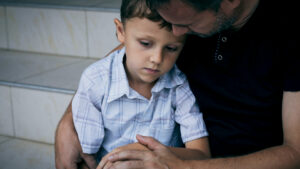Eczema and Mental Health in Children
Eczema and mental health
Research suggests that children with eczema, particularly atopic dermatitis, have higher rates of depression and anxiety. They are more likely to experience bullying in school and social isolation because of activity restrictions due to the disease.
Some symptoms of depression in children include:
- Irritability or anger
- Continuous feelings of sadness and hopelessness
- Social withdrawal
- Changes in appetite and sleep
- Outbursts or crying
- Difficulty concentrating
- Low energy, tiredness
Not all children have these symptoms. If you suspect your child is experiencing depression, talk to a health care provider or pediatric mental health specialist.
Read more about mental health issues in children.
Mood changes, including anxiety and depression, are side effects of the asthma medication montelukast. If your child is taking montelukast and experiencing symptoms of depression/ anxiety, contact their health care provider right away.
Read more about conditions related to eczema.
Eczema and your child’s behavior
The symptoms of eczema may go beyond the physical to impact your child’s behavior. Nearly 30% of children with atopic dermatitis experience disrupted sleep five or more nights a week, which can lead to daytime sleepiness, irritability, inattention and moodiness.
You can help your child sleep by keeping eczema symptoms under control through regular bathing and moisturizing and the use of OTC and/or prescription treatments as recommended by your health care provider.
ADHD and eczema
Studies show that children with eczema may have a greater risk of developing attention deficit hyperactivity disorder (ADHD).
Symptoms of ADHD include:
- Difficulty staying focused, wandering off task
- Lack of organization skills
- Hyperactivity
- Making hasty decisions that could be harmful
If your child displays these symptoms, call your doctor.

